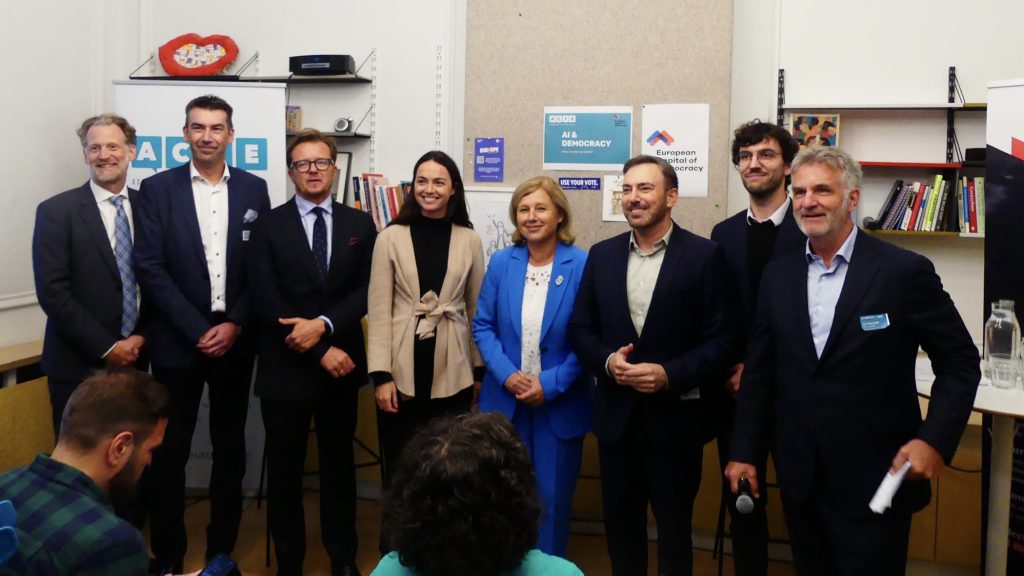On September 10, 2024, European Capital of Democracy (ECOD) and the Association Civic Tech Europe (ACTE) co-organised a roundtable titled “AI & Democracy: A New Frontier for the EU?”. The event was hosted in Brussels by Make.org, a founding member of the Association Civic Tech Europe (ACTE).
The roundtable took place in the Impact House, the Make.org Brussels premises. This high-level gathering assembled thought leaders from European institutions, civil society, and the tech sector to discuss AI’s impact on democracy. In a time when artificial intelligence reshapes the landscape of modern democracy, the discussion featured a prestigious panel of institutional leaders and civic tech experts to explore the intersection of AI and democratic governance.
The panel included: Věra Jourová, Vice-President of the European Commission for Values and Transparency, Chloé Ridel, French MEP from the S&D group, Sergey Lagodinsky, German MEP from the Greens, Michał Wawrykiewicz, Polish MEP from the EPP, and Dragoș Tudorache, former Romanian MEP (Renew) and co-rapporteur of the EU AI Act.
Helfried Carl, founder of the European Capital of Democracy initiative, warmly welcomed guests with opening remarks. He emphasized Barcelona’s role as the current European Capital of Democracy and the trust in the power of democracies, ACTE President Adrien Duguet and Make.org co-founder and president Alex Dauchez echoed this sentiment.
Axel Dauchez opened the discussion by emphasizing the dual nature of AI’s impact on democracy. He warned of AI’s potential to interfere with free will but also highlighted its power to demystify complex systems and make governance more accessible: AI will be everywhere in our cities, countries, and villages. We must acknowledge that while it poses risks to democracy, it can also act as a tool for disintermediating complexity and fostering transparency.
Věra Jourová, who headlined the event, stressed the need for a balanced approach to regulating AI. As she emphasized: It is absolutely crucial to defend freedom of speech and expression regarding AI. While we must regulate AI, we should also allow innovation to thrive. Imagine the impact totalitarian regimes could have with these technologies. We must work together to prevent that scenario while fostering AI innovation that serves the public good.
The conversation extended beyond AI’s role in Europe’s democratic future, touching on the broader goals of civic tech in Europe. Adrien Duguet, President of ACTE, highlighted the collective efforts of civic tech organizations to shape AI’s positive impact on democracy: We believe that as civic tech organizations, we can ensure AI has a more positive and effective impact on democracy.
Chloé Ridel highlighted the importance of ensuring AI regulations are aligned with European values and that they protect workers’ rights, as she noted: We need to be careful about how regulations are applied. In Europe, our priority must always be to protect rights and democracy.
Sergey Lagodinsky drew attention to the dual role of AI in either eroding or strengthening democratic processes. To highlight the potential that lies in technology, he referred to AI’s potential to create more trust in democratic systems: Not only because it will lower the thresholds for accessibility […] to understand what is going on in EU institutions, but also for civil society […] for making applications easier.
The speakers explored the potential for AI to enhance Europe’s democratic resilience. Michał Wawrykiewicz shared his experience defending democracy in Poland and warned against ignoring early signs of democratic erosion: The key lesson from my experience in defending democracy is to never ignore early red flags. Civil society and citizens must react quickly and firmly when democracy is threatened.
Dragoș Tudorache, co-rapporteur of the AI Act and former MEP, ended the discussion on an optimistic note: AI can erode trust and the concept of truth, but it can also strengthen civic participation. If we face these challenges with a positive outlook, the EU’s model could become a template for others.
A selection of the photos can be found HERE.
